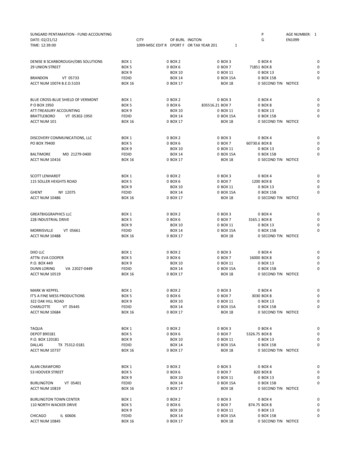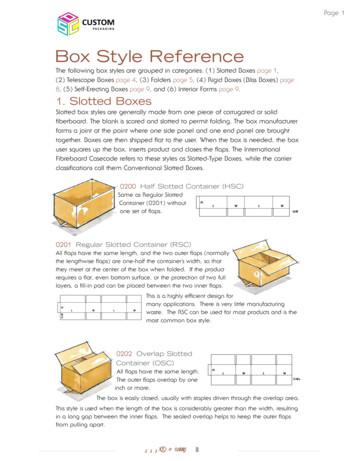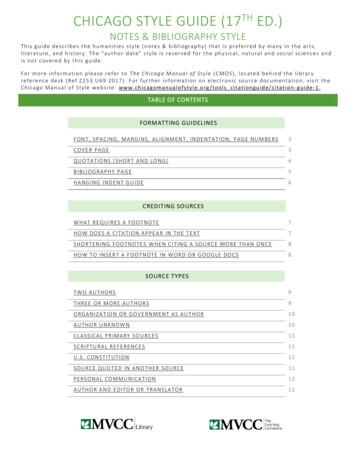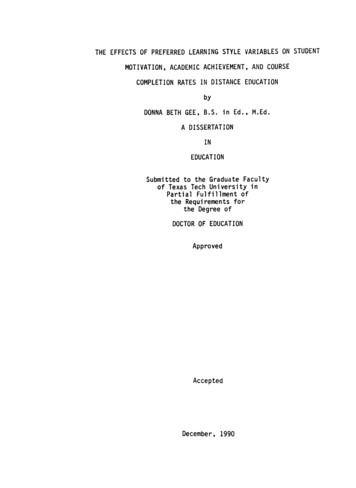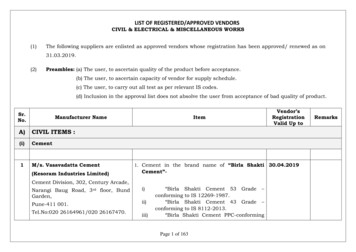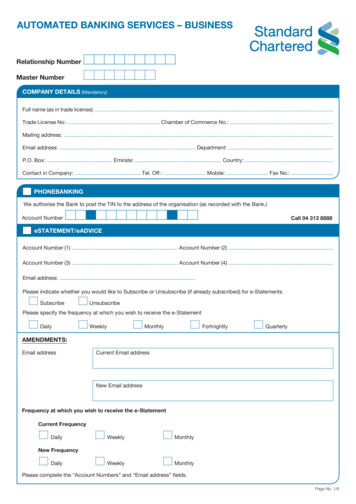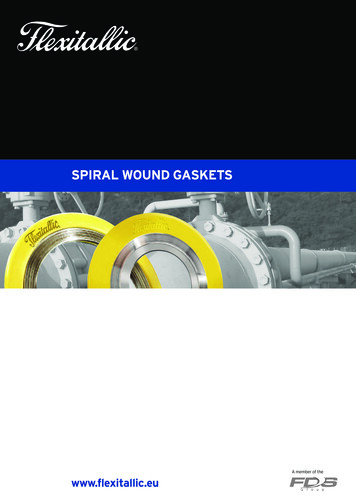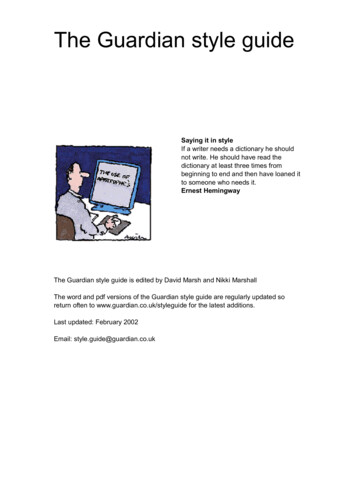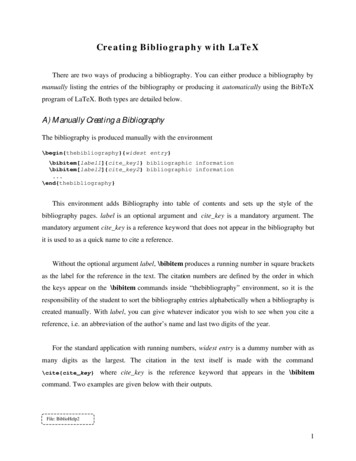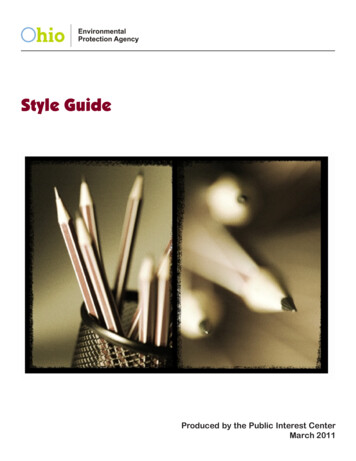
Transcription
DEdeprintedbox.comBox Style ReferenceThe following box styles are grouped in categories: (1) Slotted Boxes page 1,(2) Telescope Boxes page 4, (3) Folders page 5, (4) Rigid Boxes (Bliss Boxes) page8, (5) Self-Erecting Boxes page 9, and (6) Interior Forms page 9.1. Slotted BoxesSlotted box styles are generally made from one piece of corrugated or solidfiberboard. The blank is scored and slotted to permit folding. The box manufacturerforms a joint at the point where one side panel and one end panel are broughttogether. Boxes are then shipped flat to the user. When the box is needed, the boxuser squares up the box, inserts product and closes the flaps. The InternationalFibreboard Casecode refers to these styles as Slotted-Type Boxes, while the carrierclassifications call them Conventional Slotted Boxes.0200 Half Slotted Carton (HSC)Same as Regular SlottedCarton (0201) withoutone set of flaps.0201 Regular Slotted Carton (RSC)All flaps have the same length, and the two outer flaps (normallythe lengthwise flaps) are one-half the container's width, so thatthey meet at the center of the box when folded. If the productrequires a flat, even bottom surface, or the protection of two fulllayers, a fill-in pad can be placed between the two inner flaps.This is a highly efficient design formany applications. There is very little manufacturingwaste. The RSC can be used for most products and is themost common box style.0202 Overlap SlottedCarton (OSC)All flaps have the same length.The outer flaps overlap by oneinch or more.The box is easily closed, usually with staples driven through the overlap area.This style is used when the length of the box is considerably greater than the width, resultingin a long gap between the inner flaps. The sealed overlap helps to keep the outer flapsfrom pulling apart.
Page 2Box Style Reference0203 Full Overlap Slotted Carton (FOL)All flaps have the same length (the width of the box).When closed, the outer flaps come within one inch ofcomplete overlap.The style is especially resistant to rough handling. Stacked on its bottom panel, theoverlapping flaps provide added cushioning. Stacked on its side, the extra thickness provides added stacking strength.0204 Center Special Slotted Carton (CSSC)Inner and outer flaps are cut to different lengths. Both pairs of flaps meet atthe center of the box.The style is especially strong because both thetop and bottom have double the thickness of corrugated board. Theinner flaps, with no gap, provide a level base for the product.A variation of this box is the Side Special Slotted Carton, or SSS.All pairs of flaps meet, but not at the center of the box.0205 Center Special Overlap Slotted Carton (CSO)All flaps have the same length (one-half the lengthof the box). The length of the box can be nomore than twice its width.When closed, the inner flaps meet at the centerof the box, providing a level base and full top protection. Depending on theratio of length to width, the outer flaps overlap at random, up to full overlap.0206 Center Special Full Overlap Slotted Carton (SFF)Inner and outer flaps are cut to different lengths. When closed, the inner flapsmeet at the center of the box, and outer flaps fully overlap.With three full layers of combined board over theentire top and bottom, this style provides extracushioning when stacked on its bottom, or extrastacking strength when stacked on its side.www.deprintedbox.com
Page 3Box Style Reference0215 Snap or 1-2-3 Bottom Carton withTuck TopThe four flaps that form the bottom panel are diecut. To set up, the user folds the largest bottompanel first, then the two end panels. When theremaining bottom panel is folded and pressure isapplied near the center, the flap “snaps” into the slot created by the other panels.1/2The style is convenient for small-volume shippers who do not have automatic set-up equipment.Because the bottom is not fully sealed, it may not be suitable for heavy products.0216 Snap or 1-2-3 BottomCarton with RSC TopSame as 0215, replacing the tuck topconfiguration with RSC style flaps.0225 Full Bottom File Box, HamperStyle, Ft. Wayne Bottom, orAnderson Lock BottomWhen set up, this box provides an interlockingthickness on its bottom and on its end panels.0226 Bellows Style Top andBottom Carton0228 Integral Divider CartonRSC with Internal Divider or SelfDivider Boxwww.deprintedbox.com
Page 4Box Style Reference2. Telescope BoxesTelescope boxes usually consist of a separate top, or top and bottom that fit over each otheror a separate body. The International Fibreboard Casecode calls these boxes Telescope-Style.The truck and rail classifications call them Telescope Boxes if the cover extends over at leasttwo-thirds of the depth, and Boxes with Covers if the cover extends over less than two-thirds ofthe depth.0301 “SS”, 0301 “ES” Trays, Design Style0301 Full Telescope Design StyleCarton (FTD)The two-piece box is made from two scoredand slotted blanks (trays).0306 Design Style Cartonwith Cover (DSC)0310 Double Cover Carton (DC)A tube forms the body. The two interchangeable covers areusually design style. The pieces are shipped flat to the user,who opens the tube and sets up thecovers.The style is frequently used for tallor heavy products that would bedifficult to lower into a box. The item is placed on the bottom cover, and the tubeis lowered over the product.0320 Full Telescope HalfSlotted Carton (FTHS)The two-piece body is made from twohalf-slotted containers.www.deprintedbox.com
Page 5Box Style Reference0325 Interlocking Double CoverCarton (IC)Flanges on the body, folded together(interlocked/baseloid) with flanges on the covers,are held in place with strapping.The style offers the same ease of packing providedby the double-cover box, with the assurance that thecovers will not separate from the body. This feature is advantageousfor moving large or heavy products such as washers, dryers, refrigerators, water heaters, vendingmachines and some hazardous materials.0351 Octagonal Double Cover CartonSame as 0310 with additional panels.3. FoldersFor folders, one or more pieces of combined board provide an unbroken bottom surface, andare scored to fold around a product. The International Fibreboard Casecode describes them asFolder-Type Boxes. The carrier classifications use the term Folders.0401 One Piece Folder (OPF)One piece of board is cut so that it provides a flatbottom, with flaps forming the sides and ends, andextensions of the side flaps meeting to form the top.0403 One Piece Folder with AirCell/End Buffers, Protect Allor Bookwrapwww.deprintedbox.com
Page 6Box Style Reference0406 Wrap Around BlankA wrap-around blank is formed into a box byfolding it tightly around a rigid product. Thepositioning of the product, folding and sealingare performed by automatic equipment.The finished box is essentially an RSC, turned on its side so that the bottom and top areunbroken. The joint, however, is not formed until the final closure.0410 Five Panel Folder (FPF) or HarnessStyle Five Panel FolderA single cut and scored piece features a fifth panel used asthe closing flap, completely covering a side panel. Theclosed box has several layers of combined board oneach end, providing stacking strength and protectionfor long articles of small diameter which might bedamaged, or damage the box, if pushed through the ends.0411 Center Seam FPF0415 One Piece Folder(OPF) with Dust Flaps0416 One Piece Folder(OPF), Die Cut withDust and Tuck Flapswww.deprintedbox.com
Page 7Box Style Reference0422 Roll End Tray, Walker Lock Tray,or Tray with Self Locking EndsFormed from a single piece of combinedboard, the design features an unbroken bottom,and several layers of corrugated in the end panels.Trays are not shipping containers, but they are frequentlyused as inner containers for parts, delicate produce, letter mail and other products, or as elementsof display stands.0427 Roll End Tray with Locking Cover0457 Self LockingTray, Joint-less Tray0460 Display Tray or High Wall Tray0470 Roll End Tray with Tuck Top andInterior Bottom Flaps or Reverse WalkerLock with Inside Tuck Topwww.deprintedbox.com
Page 8Box Style Reference4. Rigid Boxes (Bliss Boxes)The three pieces of a rigid box style include two identical end panels and a body that folds toform the two side panels, an unbroken bottom and the top. Flaps used to form the joints canbe on the end pieces or the body or both. The end panels are attached to the body with special equipment, usually at the user’s plant. Six or more joints must be sealed to set up the boxbefore it is filled. The name Rigid Boxes comes from the fact that once the six or more jointsare sealed, the box is rigid. The International Fibreboard Casecode identifies these styles asRigid-Type Boxes. In the carrier classifications, rigid boxes are classified as Conventional SlottedBoxes or Recessed End Boxes.0601A Bliss Style Carton withEnd Flaps0601B Bliss Style Carton with EndFlaps and End Panel Legs0606A Bliss Style Carton0606B Bliss Style Cartonwith End Panel Legswww.deprintedbox.com
Page 9Box Style Reference5. Self Erecting Boxes0711 Pre-glued Auto Bottom with RSC Top FlapsThe top panels of the box are usually those ofa regular slotted Carton.For a telescope-style box, two self-erectingpieces can be used (International FibreboardCase Code: 0714).0760 Self Erecting Six Corner Tray6. Interior FormsLiners, tubes, pads, build-ups, dividers, partitions and other inner packing pieces can bemade in an infinite variety of ways to separate or cushion products, to strengthen the boxor to prevent product movement by filling voids. They may be simple rectangles, or scored,slotted, scored and slotted, or die-cut shapes.Many of the common interior forms have been given International Fibreboard Casecodenumbers. The carrier classifications provide specifications for some pieces used in the packingof glassware and other fragile articles.0900 PadsPads are plain shapes of corrugated or solid fiberboard. They can be used to fillthe space between the inner flaps of an RSC, to completely cover the bottom or topof a box, or to separate layers of product. Vertically, they can be used to separateproducts.www.deprintedbox.com
Page 10Box Style ReferenceTubes are scored rectangles, folded and sometimes joined with tape to form a multi-sided structureopen at both ends. When used as sleeves for individual items such as glassware, adjacent shells providedouble protection.0908 Tube0904 Tube0909 Tube0905 Tube0910 Tube0906 Tube0914 Tube0907 Tubewww.deprintedbox.com
Page 11Box Style ReferencePartitions or dividers provide a separate cell for each item in a box. They are used primarily forglassware and other fragile articles.0931 Partition4x0920 Partition0933 Partition0921 Partition0935 Partition2x1x0930 Partition2x2xwww.deprintedbox.com
Page 12Box Style Reference0965 Inner Packing PieceScored and folded inner packing pieces cantake many shapes. Included in this group arebuilt-up pads consisting of multiple piecesglued together. Inner packing pieces are usedfor cushioning, suspension and separation, andto fill voids. The suspension function holds theproduct away from the walls of the box tolessen the impact of drops or bumps.Completely filling the voids created by irregularly shaped products adds stacking strength tothe box.0966 Inner Packing PieceInner packing forms are usually die cut to0967 Inner Packing Formposition and support irregular productsfrom below, or lock them into position fromabove. Alternatively, forms can be placed ontwo sides or ends of a product. Some inner packing forms are extensions of the box flaps.Die-Cut Support PadInner Packing FormInformation supplied by Fiber Box Associationwww.deprintedbox.com
Box Style Reference The following box styles are grouped in categories: (1) Slotted Boxes page 1, (2) Telescope Boxes page 4, (3) Folders page 5, (4) Rigid Boxes (Bliss Boxes) page 8, (5) Self-Erecting Boxes page 9, and (6) Interior Forms page 9. 1.Slotted Boxes Slotted box styles are generally made from one piece of corrugated or solid fiberboard.
